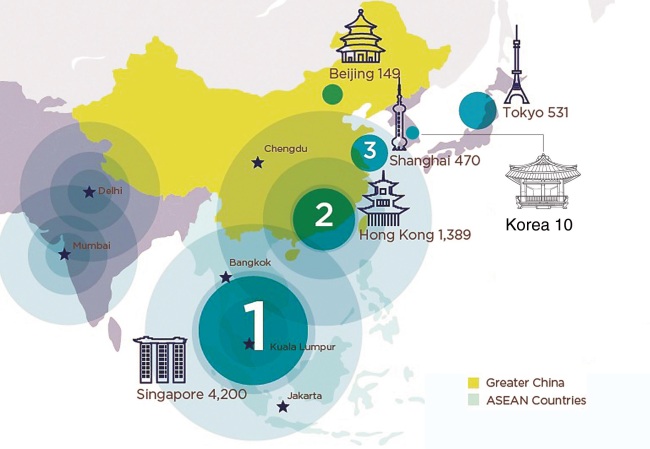 A report on the attractiveness of six Asian locations as regional corporate headquarters showed Korea lags far behind.
A report on the attractiveness of six Asian locations as regional corporate headquarters showed Korea lags far behind.
The study titled “Asia Pacific Regional Headquarters,” released by Cushman & Wakefield, a global real estate agency, on Friday, showed that Singapore remains the most attractive Asia-Pacific destination for multinational companies, followed by Hong Kong and Shanghai.
The number of regional corporate head offices in Singapore, Hong Kong and Shanghai reached up to 4,200, 1,389, and 470 in 2014, respectively. Sydney (553), Tokyo (531) and Beijing (142) took the third to sixth places.
The top two destinations have maintained their dominant position for years, armed with longstanding favorable economic and regulatory environments that are designed to attract companies.
“Hong Kong, however, faces a higher cost of living and increasing competition from Tier 1 Chinese cities,’’ said Dominic Brown, the coauthor of the report at Cushman & Wakefield.
In fact, Shanghai with direct access to China has been the great improver by increasing from just 53 regional corporate head offices in 2003 to 470 in 2014, the report said.
On the other hand, the report showed how much Seoul lagged behind in the race to attract regional corporate head offices, compared with those six Asia-Pacific destinations.
According to the Ministry of Trade, Industry and Energy, about 10 head offices of multinational companies were located in Korea last year.
“Despite the ministry’s efforts to lure regional corporate offices with more incentives, the number has been stagnant for the past few years,’’ said Kim Sung-joon of the foreign investment attraction division of the ministry.
As for new incentives, Kim said the ministry lowered the income tax rate for foreign executives of a regional office to 17 percent.
The analysis of Cushman & Wakefield, however, pointed out tax benefits are not a sufficient condition to attract corporate regional offices.
Rather, the company advised Korea to target smaller regional head offices and for there to be numerous divisional headquarters across the region taking advantage of Korea’s strengths.
Efforts should be made to target a functional head office of a multinational enterprise which seeks ties with Korean companies and makes the most of the nation’s advanced business infrastructure.
As a case in point, German industrial giant Siemens set up its Asia-Pacific regional headquarters for its energy solutions business in Korea in 2013.
Siemens’ business unit provides various solutions for the supply of power plants.
“The company put more focus on advantages from partnership with Korean power plant builders and leveraging qualified human resources in Korea rather than geographical advantage when it chose the location of the regional office of its energy solution business,” Lee Seung-yeon of Siemens Korea said.
By Seo Jee-yeon
(jyseo@heraldcorp.com)



